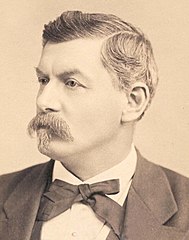This is the counterpart of my CS electoral TL.
I don't know enough about the US electoral history, so I will remain rather vague.
US presidential election - November 1864
Background:
By the fall of 1864, the civil war has reached a stalemate. The failure to obtain a clear advantage has caused strengthening of partisans of a peace.
The Peace Democrats have nominated the hero of the first times of the war, General McClellan, as their candidate to the presidential election, on a peace platform, with the congressman Pendleton as his running mate.
For a time, the Republican Party has almost been about to break apart: the Radical Republicans had nominated General Frémont as their candidate, seeing Lincoln as an incompetent President; however, feeling that his candidacy could only cause the defeat of Lincoln, Frémont had withdrawn.
In the meantime, the supporters of Lincoln had formed the National Union Party and had nominated Andrew Johnson as his running mate, hoping to gain support of the War Democrats.

President A. Lincoln (NU-IL) / Military Governor A. Johnson (NU-TN) ; 111 electoral votes (50,9 % of the popular vote)
General G. B. McClellan (D-NJ) / Representative G. H. Pendleton (D-OH) ; 122 electoral votes (49,1 % of the popular vote)
This election has surely been the most controversial presidential election of US history.
While Lincoln has won the popular vote with an advance of about 74,000 voices over his adversary, he hasn't won an electoral majority.
New Hampshire and Maryland have surely been the states where has been decided the election, McClellan having won them by only a few dozens of votes.
Final Result:
Elected 17th President of the USA

George Brinton McClellan
from New Jersey
Elected 16th Vice President of the USA

George Hunt Pendleton
from Ohio

I don't know enough about the US electoral history, so I will remain rather vague.
US presidential election - November 1864
Background:
By the fall of 1864, the civil war has reached a stalemate. The failure to obtain a clear advantage has caused strengthening of partisans of a peace.
The Peace Democrats have nominated the hero of the first times of the war, General McClellan, as their candidate to the presidential election, on a peace platform, with the congressman Pendleton as his running mate.
For a time, the Republican Party has almost been about to break apart: the Radical Republicans had nominated General Frémont as their candidate, seeing Lincoln as an incompetent President; however, feeling that his candidacy could only cause the defeat of Lincoln, Frémont had withdrawn.
In the meantime, the supporters of Lincoln had formed the National Union Party and had nominated Andrew Johnson as his running mate, hoping to gain support of the War Democrats.
President A. Lincoln (NU-IL) / Military Governor A. Johnson (NU-TN) ; 111 electoral votes (50,9 % of the popular vote)
General G. B. McClellan (D-NJ) / Representative G. H. Pendleton (D-OH) ; 122 electoral votes (49,1 % of the popular vote)
This election has surely been the most controversial presidential election of US history.
While Lincoln has won the popular vote with an advance of about 74,000 voices over his adversary, he hasn't won an electoral majority.
New Hampshire and Maryland have surely been the states where has been decided the election, McClellan having won them by only a few dozens of votes.
Final Result:
Elected 17th President of the USA

George Brinton McClellan
from New Jersey
Elected 16th Vice President of the USA

George Hunt Pendleton
from Ohio
Last edited: